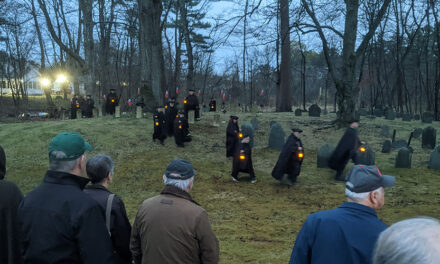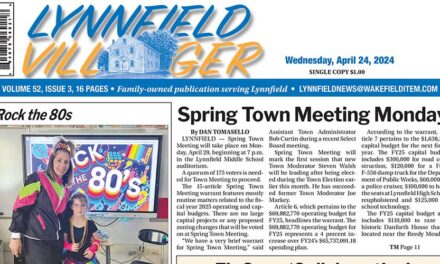Published June 24, 2020

OVER 100 RESIDENTS attended Town Meeting at Pioneer Stadium on Saturday, June 20. (Dan Tomasello Photo)
By DAN TOMASELLO
LYNNFIELD — Forty-two minutes.
That’s all it took for the Annual Town Meeting to wrap up municipal business at Lynnfield High School’s Pioneer Stadium on Saturday, June 20. Just over 100 voters attended Town Meeting after the Board of Selectmen voted last Wednesday to reduce the 175-voter quorum requirement to 40 voters for this one session of Town Meeting.
Residents sat 9-feet apart on the football field in 85-degree heat for this historic session of Town Meeting, which is usually held in the Lynnfield Middle School auditorium. Attendees were required to wear face masks, and a number of residents brought water bottles in order to stay hydrated. There were even residents who brought umbrellas in order to stay cool.
Additionally, a group of firefighters were on hand to disinfect a microphone whenever residents spoke.
Article 13 generated the most discussion at Town Meeting. The warrant article asked voters to approve a general bylaw amendment that would prohibit minors from sitting at bars in restaurants and clubs.
While the Board of Selectmen unanimously supported Article 13, the Finance Committee came out against the proposed bylaw.
“At this point, the Finance Committee felt like this was not a town issue, but a state issue to govern,” said Finance Committee Chairman Chris Mattia.
Selectman Dick Dalton disagreed with Mattia’s viewpoint.
“This is a local issue because liquor licenses are under the Board of Selectmen’s jurisdiction,” said Dalton.
Dalton recalled that the proposed general bylaw originated after town officials learned children were allowed to sit at the 99 Restaurant’s bar. He and Town Administrator Rob Dolan met with restaurant managers in order to discuss the issue.
“I have been a chief operating office and chief executive officer for restaurants on the East Coast and the West Coast,” said Dalton. “I am very familiar with regulations, and I don’t favor regulations for businesses. But in this case, I thought what came about needed some action. We brought everyone together and we discussed children being seated at the bar, not at the high-top tables.”
Dalton said all of the restaurants except the 99 Restaurant currently prohibit minors from sitting at the bar.
“Instead of having a consensus from the group and have them self-regulate, I deemed it appropriate that we as a community talk about what is appropriate within these restaurants,” said Dalton. “We have a lot of good operators and this is just a misguided practice by one single restaurant. No one else does it.”
Townsend Road resident Mark Driscoll said he opposed Article 13.
“I strongly feel this is a parental decision and is not one for the town to decide,” said Driscoll. “The 99 is the only restaurant in town that allows children to sit at the bar. It is their corporate policy to follow state laws and to allow parents to make that decision. Coming out of COVID-19, restaurants need less regulations, not more.”
Patrice Lane resident Pat Campbell expressed her support for Article 13.
“If families go out to dinner, they can sit at the tables and not at the bar,” said Campbell. “It’s just not necessary.”
In response to a question from Finance Committee Vice Chairman Tom Kayola, Town Counsel Tom Mullen said the bylaw “would establish a rule for all licensees.”
After the discussion, Article 13 was approved 69 votes to 32 votes.
Zoning change defeated
Town Meeting voted to reject Article 14, which sought to ensure that any change to the Zoning Bylaw still require a two-thirds vote in order to pass Town Meeting.
Former Planning Board Co-Chairman Alan Dresios submitted Article 14 as a citizens’ petition in the wake of state lawmakers considering several bills that would update zoning change requirements from a two-thirds vote to a simple majority vote. He said Article 14 strived to “protect the character of Lynnfield.”
“It is our town,” said Dresios. “We know what we want. Why should outsiders decide what our town looks like? Voting yes helps us keep control of our town. Outside interests have tried to remake cities and towns in their vision for over 50 years now. Let’s keep control of our town.”
The Planning Board and the Finance Committee both voted not to recommend Article 14. The selectmen recommended that the warrant article be indefinitely postponed.
Mullen noted state law currently requires two-thirds votes in order to approve zoning changes.
“As long as that is the case, this article would not add anything,” said Mullen. “The problem is what if the State Legislature changes the Zoning Enabling Act. There are bills that would allow some or maybe all zoning amendments to pass by majority vote. I understand this article intends to deal with that situation, but this would be ineffective. A court or the attorney general would say this article fails. The reason is under the Home Rule Amendment in the State Constitution, we have the right to pass virtually any kind of bylaw that the State Legislature could pass as a statute.”
If lawmakers changed the approval process for zoning amendments, Mullen said the bylaw would conflict with state law.
After the discussion, Article 14 was defeated 69 votes to 27 votes.
Budgets OK’d
In addition to Articles 13 and 14, Town Meeting approved the two proposed spending plans for fiscal year 2021 as well as several financial-related warrant articles.
The FY21 operating budget, totaling $58,174,347, was approved under Article 6. The spending plan represents a 2.6 percent increase over FY20’s $57,199,707 appropriation.
Prior to the start of Town Meeting, the School Committee unanimously approved a $26,651,605 operating budget for FY21, representing a 3 percent increase over FY20’s spending plan. School officials were able to add five new positions into the budget, including a kindergarten teacher and a paraprofessional for Summer Street School in the wake of increasing enrollment. The School Department was also able to add a special education team chairperson for the elementary schools and two adjustment counselors for the elementary schools.
The School Department was able to keep the adjustment counselor positions in the final budget due to out-of-district special education tuition savings as well as reducing expense budgets.
Campbell criticized the School Department’s decision to add the five positions.
“This is setting us on an unsustainable path,” said Campbell.
After Campbell finished criticizing the school budget, Town Meeting approved Article 6.
In addition to approving the next fiscal year’s operating budget, a $1,936,900 capital budget for FY21 was unanimously approved under Article 7.
Voters approved Article 8, which will allocate $150,000 from Free Cash to the town’s Stabilization Fund. Town Meeting also set spending limits on the town’s various resolving funds by approving Article 9.
Article 10 was also approved, which will allocate $801,702 to the town’s Emergency Medical Service (EMS) Enterprise Fund. Voters approved Article 11, which will appropriate $950,000 from Golf Course Enterprise receipts in order to pay for expenses and contractual services for the two town-owned golf courses.
Town Meeting signed off on making improvements to the Town Common by approving Article 12. The warrant article asked voters to allocate $200,000 from Free Cash in order to make improvements to the Town Common.
Campbell inquired what the Town Common improvement project entails.
Town Administrator Rob Dolan said the improvements include constructing new walkways and curbing, installing a new electrical system, new lights, and making sidewalk and crosswalk improvements.
“These improvements will make the Common a center point in the community,” said Dolan. “I think the community will be very pleased.”
Town Meeting unanimously approved Article 1, which accepted reports from town officers and special committees.
Article 2 was also passed unanimously, as Betty Adelson, David Crockett and Robert MacKendrick were elected as field drivers; Crockett was elected pound keeper; and Ken Burnham, Crockett and MacKendrick were elected wood measurers.
Article 3 was approved by Town Meeting, which set the pay rate for members of the Board of Selectmen and the Board of Assessors. Selectmen Chairman Chris Barrett noted the pay for selectmen chairman is $850, while the other selectmen will each receive $700. The pay rate for the Board of Assessors is $4,100 for the chairman and $3,550 for the other two members.
Town Meeting approved Article 4, which will transfer $75 from the Cable PEG Account in order to balance the current FY20 budget. Article 5 was unanimously approved, which appropriated $5,532 from Free Cash in order to pay overdue bills.
Before Town Meeting was adjoined, Barrett thanked retiring Superintendent Jane Tremblay for her 34 years of dedicated service to Lynnfield. Town Meeting also gave her a standing ovation.
“Jane has done an extraordinary job as a teacher, an administrator and as superintendent of schools,” said Barrett.
Moderator Joe Markey also recognized Tremblay along with retiring Building Inspector Jack Roberto and former Planning Board member Charlie Wills at the beginning of Town Meeting.




